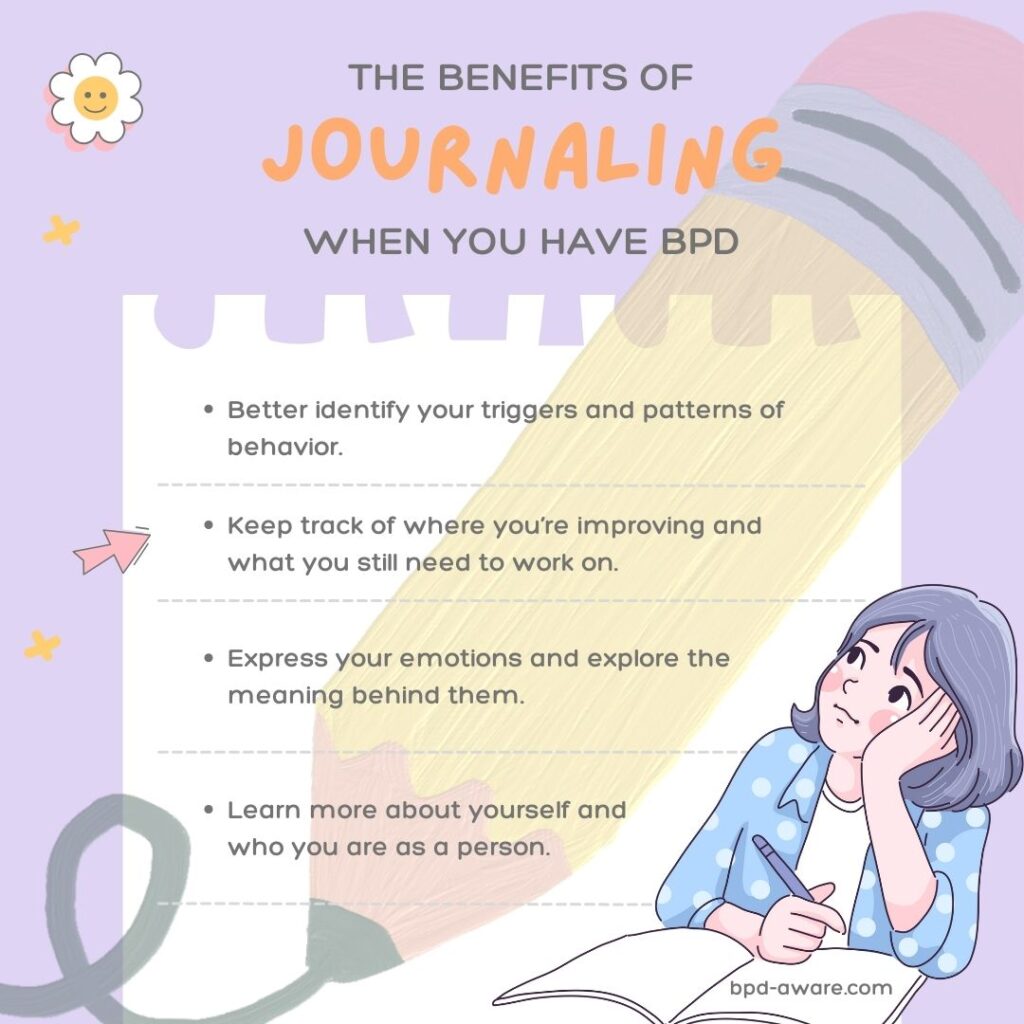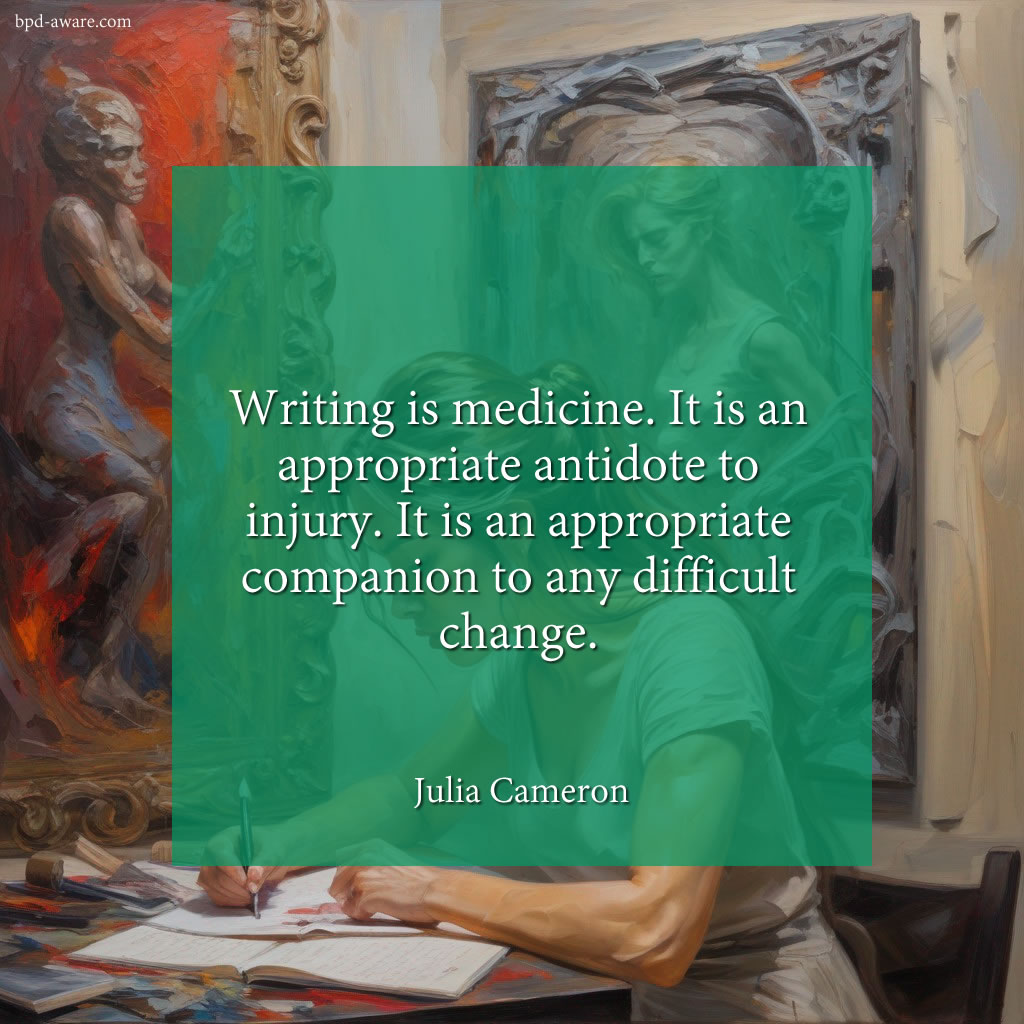Keeping a journal that you write in daily is a valuable tool that can help you manage your Borderline Personality Disorder in a manner that is more clinical while allowing you to express yourself all at the same time.
Writing down your thoughts and feelings for the day you’ve just experienced can be incredibly therapeutic. Most therapists will recommend that you keep a diary while you’re undergoing therapy. It’s a form of self-therapy that can help you in more ways than you can imagine and has been one of the most important tools in my recovery.
Writing is a fantastic hobby for people with BPD and keeping a journal is a great way to make sure you write every day.
Why Keep a BPD Journal?
There are many compelling reasons to keep a journal of your BPD journey, including:
Identifying Triggers – When you keep a daily journal you allow yourself to play detective in many aspects of your life. When you go back and read portions of your journal, you will likely begin to notice certain triggers that you need to avoid and/or work on improving your emotional response to. Having your life in writing makes who and what triggers you much easier to see and harder to lie to yourself about.
Tracking Improvements and Relapses – By tracking your mood and emotional responses, you can begin to spot where you’re improving, where you’re not, and when and where you might be relapsing into bad habits.
Accountability and Discipline – When you keep track of your goals and the actions you take to achieve those goals you have a written document that keeps you accountable. Most people with BPD (and even those without) work much better when they keep lists of things they want to do. Ticking things off the list is rewarding and provides a little hit of dopamine. Doing healthy things can become a habit this way.
Expressing and Exploring Your Emotions – Your journal can become one of your best friends. You can tell it anything without fear of judgment or repercussion – no matter how dark your thoughts. This can help to remove the weight from your shoulders when you feel overburdened – which can be most of the time when you have Borderline Personality Disorder.
Self-Discovery – Keeping a journal can be like setting off on a long voyage of self-discovery. Many people with BPD have issues with their self-identity but keeping a journal can help you realize who you are, what makes you tick, and what type of person you strive to be.

What You Need
All you need to keep a good BPD journal is a notepad and a pen. That’s it. I’d recommend an A4 notepad (or something reasonably sizeable) rather than a diary so that you have more room to write without restrictions.
In terms of a pen, you can go with your personal preference. Maybe you’re fine using whatever you have to hand or perhaps you like to get fancy with your choice of pens.
The reason I prefer the pen-and-paper approach is threefold. One is that it’s easy to get distracted by social media or the millions of other diversions a phone or laptop can provide. Two is that you have a physical record of your progress – which is much harder to accidentally delete or get corrupted. Third is that I simply enjoy the more tactile feel of physically writing pen to paper rather than tapping away on a keyboard.
If you prefer to use a phone or computer, that’s okay too. There are advantages to this method such as increased privacy and (at times) it can be more convenient.
I would recommend giving the notepad and pen approach a try first though.
How To Journal
The hardest part of any task is getting started and the best way is to just throw yourself into the pool as quickly as possible. Don’t spend days researching and finding the perfect notepad and pen, just grab a sheet of paper and get started!
Here are some other tips on how to start and keep writing your BPD journal.
Write Every Day – Give yourself a window of time every day to write in your journal. Most people prefer to write in their journals at the end of the day, an hour or two before they go to sleep. This way, the day is still fresh and vibrant in your memory. It also can help you to cool down from any negativity the day has produced so that you sleep better.
Don’t Restrict Yourself – Some days you’ll have more to write about than others. Don’t force yourself to write 500 words a day when you don’t feel like you have much to say. A few words can be more powerful than thousands. You don’t have to just write either. Including sketches or doodles in your journal is a great way to express yourself and is just as valid a way to journal as any. It’s YOUR journal – do what feels right for you.
Make It Easy – You might have a main notepad in your bedroom that you like to journal in but it can also be helpful to have a pocket notebook to keep smaller notes in when the need arises and you’re out of the house. You can transfer these notes to your main journal later.
Keep It Safe and Private – Find a good spot to hide your journal so that you can feel safe in writing whatever you want without prying eyes finding it. A notepad with a lock or kept in a safe (or both!) hidden out of the way can provide you the peace of mind you need to write your innermost thoughts.

What To Write About in Your BPD Journal
You can write about pretty much anything you want in your journal but there are certain points you’ll want to hit on to get the most out of your journaling to help you recover from Borderline Personality Disorder. You don’t need to answer every question below, they are merely intended as prompts to get you started.
Events of the Day – Were there any noteworthy events that happened to you today? How did they make you feel and how did you react? Was this healthy? What could you have done better next time? Did you practice your DBT skills? What made you happy today? What situations did you handle well? Did you get a chance to practice one of your hobbies? What have I learned about myself today?
Past Events – Is there anything from the past on your mind today? Why is it on your mind? What would you have liked to have happened? What could you have done differently? Have you come to accept that the past cannot be changed?
Healthy Living – What did you eat today? Did you take a shower or bath? Did you get a good night’s rest? Did you do any exercise? Did you socialize? Did you go to therapy or do your therapy homework? Have you taken your medication?
Improvements – Where do you feel like you’re seeing improvements about yourself or your life in general? What habits and skills have you picked up that are working well for you?
Setbacks – Have you slipped back into any bad habits? How will you avoid these bad habits tomorrow? Did you react to something in a way that you know was maladjusted? How will you prevent this in the future? Are you splitting on something or someone?
To-Do List For Tomorrow – What tasks do you want to get done tomorrow? How are you going to live a healthy lifestyle? What skills do you plan on practicing to improve your BPD? How will you build on improvements and avoid setbacks?
Final Thoughts
I hope this article has inspired you to start keeping or continuing to keep a journal about your life and your battles with BPD. Journaling is a fantastic tool to help anyone improve their life but can be particularly powerful for those of us with Borderline Personality Disorder. Your journal can be a friend, therapist, and confidant.
Are you going to start a journal tonight? Have you already been journaling? We’d love to hear your story in the comments below!
Sources, Resources, and Further Reading
- How to journal for mental health: 7 tips to get started: https://www.calm.com/blog/how-to-journal-for-mental-health
- DBT Journal Prompts: https://www.carepatron.com/blog/dbt-journal-prompts
- The Neuroscience of Journaling And Its Benefits: https://medium.com/clear-yo-mind/the-neuroscience-of-journaling-and-its-benefits-a91218773159
- 6 Journaling Benefits and How to Start Right Now: https://www.healthline.com/health/benefits-of-journaling
















